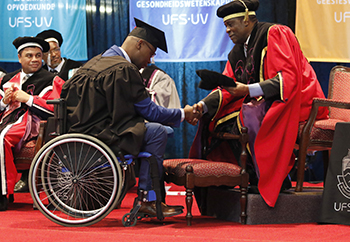Latest News Archive
Please select Category, Year, and then Month to display items
03 October 2018
|
Story UFS
|
Photo Katlego Sekele
 Students engaged authorities and Student Affairs
representatives on sexual and gender-based matters.
Students engaged authorities and Student Affairs
representatives on sexual and gender-based matters.
Do you know enough about the Sexual Harassment, Sexual Misconduct and Sexual Violence policy adopted by the university in June 2018? The Office for Gender and Sexual Equity (GSE) at the University of the Free State (UFS) hosted a dialogue on the role of the institution in matters of sexual and gender-based violence and addressing issues surrounding sexual violations.
Developments such as the countrywide #TotalShutdown: Intersectional Women’s March Against Gender-based Violence last month serve as proof of the dire need for issues surrounding sexual violations to inform policies and active safety measures.
Policy purpose
According to the policy, the objectives are to create a safe and enabling environment, establish a common understanding of what constitutes sexual harassment, sexual misconduct and sexual violence, provide applicable and accurate information, ensure that victims receive the necessary support, clearly outline disciplinary procedures for perpetrators, and clarify institutional accountability.
Student’s take on solutions
Tammy Fray, a member of the Student Representative Council, who formed part of the panel at the discussion, says the policy is not a one-stop-shop solution. “The policy is a guiding document. We have to then use it to inform activist work. We cannot always put the onus on policies and codes of conducts to solve problems. However it is our responsibility within this academic space to come up with solutions that enhance the way the policy works.”
Be informed about the policy
It is important to understand the stipulations of the policy in order to make full use of it. Geraldine Lengau, Officer at the GSE said: “It’s important that students know that the institution is not operating in silos but that their demands have been heard and the institution has acknowledged that there is a need for the policy to be adopted. It also makes the process of reporting better with the assistance of the Sexual Assault Response Team coordinator.”
Largest number of CUADS graduates at UFS
2017-07-03

During the mid-year graduation ceremonies at the
University of the Free State (UFS), the Centre for
Universal Access and Disability Support (CUADS) saw
the largest number of students with disabilities graduating.
Photo: Johan Roux
During the mid-year graduation ceremonies at the University of the Free State (UFS), the Centre for Universal Access and Disability Support (CUADS) saw the largest number of students with disabilities graduating.
For the first time since being established in February 2001, a total number of 30 students graduated, of which seven were postgraduate students.
Accomplishing your dreams as a student
Martie Miranda, Head of CUADS, says that one cannot help but become emotional with joy and happiness. “The feeling of satisfaction we feel with the graduates is so valuable, because it’s a reminder of their abilities to accomplish their dreams just like any other student.”
CUADS aims to ensure that the UFS creates opportunities for students with disabilities, aiming to become a higher-education institution recognised for its efforts in human reconciliation. Together with the Exam Division, CUADS coordinates alternative assessment with an accessible test and examination facility housed at CUADS. This accommodates students with concessions, amanuensis, specialised equipment, and accessible formatted papers.
Changing the challenges you experience
Miranda continuously encourages students to keep going. “If being successful is important to you, you will find a way to change the challenges you experience into opportunities. Either to learn something about yourself or teach someone else something.”
Below are the number of graduates from each faculty:
• Faculty of Law: 2
• Faculty of Economics and Management Sciences: 4
• Faculty of Education: 4
• Faculty of Natural and Agricultural Science: 9
• Faculty of the Humanities: 11